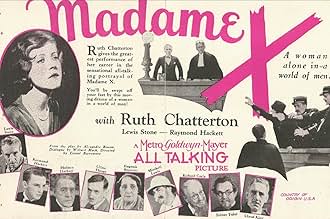A young lawyer unknowingly defends his mother who abandoned him when he was three.A young lawyer unknowingly defends his mother who abandoned him when he was three.A young lawyer unknowingly defends his mother who abandoned him when he was three.
- Nominated for 2 Oscars
- 3 wins & 2 nominations total
Ullrich Haupt
- Laroque
- (as Ullric Haupt)
Claude King
- Valmorin
- (as Claud King)
Henry Armetta
- Hotel Owner
- (uncredited)
Agostino Borgato
- Hotel Porter
- (uncredited)
Jack Chefe
- Nightclub Waiter
- (uncredited)
Ronnie Cosby
- Boy at Puppet Show
- (uncredited)
Carrie Daumery
- Dining Room Guest
- (uncredited)
- Director
- Writers
- All cast & crew
- Production, box office & more at IMDbPro
Storyline
Did you know
- TriviaNo music is heard under the opening or closing credits of Madame X, which was the result of a short-lived practice in which studios expected the local theater musicians to provide live accompaniment to the opening credits of sound films. Keyboardists and orchestras were still working in the theaters in the late 1920s providing music for silent films still in distribution. Live music was a way to make the screening more of a special event and not a purely "canned" presentation.
- ConnectionsAlternate-language version of La mujer X (1931)
Featured review
It's interesting that the rebellion against Victorian mores lasted until well into the 20th century. This story of the endurance of Mother Love and the cruel implacability of Victorian morality is much contrived ado about nothing.
Like too many early talkies it is extraordinarily dull: there is no background music, little cutting and the camera work is static. Self-indulgent, stagy scenes are allowed to run on for too long. The gloomy sets, dark painted flats such as one must have seen on the Victorian stage and as can be seen in early silent films, are only dimly illuminated. The gloss that MGM became known for is not in evidence here.
The only point of interest in this film is that it is a record of the talent and style of Ruth Chatterton, one of the foremost stage stars of the '20s, and a star of early talkie films. Unfortunately, though a definite professionalism and artistry are evident, they also expose her as a shallow and posturing actress. With her slack body, puffy face and large, bleary eyes, she exudes masochism and self-pity from her very first scene, and this sense of weary defeat is sounded again and again without variety. More of a problem is her voice: her plummy and very deliberate diction (perhaps a by-product of early sound recording) gives lie to what is supposed to be a display of deep feeling. Her performance is nothing but empty technique, all of which imitates and indicates intense feeling without actually showing any. Where is the energy and life of real emotion? It isn't here.
In fact, polished, lifeless performances like this suggest why Bette Davis's work in OF HUMAN BONDAGE was like a gust of cold, clear air in the movies: In that film, Davis is full of the grit, spite and energy of real life. When her Mildred gets angry, there is a real sense of danger and excitement in it, an almost out-of-control sexual edge. The tension, intensity and unexpectedness in Davis's best work is exactly what is lacking in Chatterton's playing at emotion. This film is strictly for students of early sound films, or devotees of outmoded styles in stage and screen acting.
Like too many early talkies it is extraordinarily dull: there is no background music, little cutting and the camera work is static. Self-indulgent, stagy scenes are allowed to run on for too long. The gloomy sets, dark painted flats such as one must have seen on the Victorian stage and as can be seen in early silent films, are only dimly illuminated. The gloss that MGM became known for is not in evidence here.
The only point of interest in this film is that it is a record of the talent and style of Ruth Chatterton, one of the foremost stage stars of the '20s, and a star of early talkie films. Unfortunately, though a definite professionalism and artistry are evident, they also expose her as a shallow and posturing actress. With her slack body, puffy face and large, bleary eyes, she exudes masochism and self-pity from her very first scene, and this sense of weary defeat is sounded again and again without variety. More of a problem is her voice: her plummy and very deliberate diction (perhaps a by-product of early sound recording) gives lie to what is supposed to be a display of deep feeling. Her performance is nothing but empty technique, all of which imitates and indicates intense feeling without actually showing any. Where is the energy and life of real emotion? It isn't here.
In fact, polished, lifeless performances like this suggest why Bette Davis's work in OF HUMAN BONDAGE was like a gust of cold, clear air in the movies: In that film, Davis is full of the grit, spite and energy of real life. When her Mildred gets angry, there is a real sense of danger and excitement in it, an almost out-of-control sexual edge. The tension, intensity and unexpectedness in Davis's best work is exactly what is lacking in Chatterton's playing at emotion. This film is strictly for students of early sound films, or devotees of outmoded styles in stage and screen acting.
- tjonasgreen
- Feb 24, 2004
- Permalink
Details
- Runtime1 hour 35 minutes
- Color
- Aspect ratio
- 1.20 : 1
Contribute to this page
Suggest an edit or add missing content




































